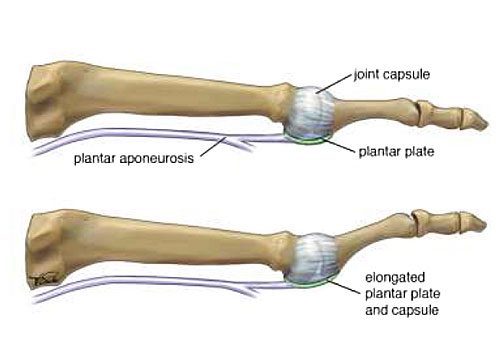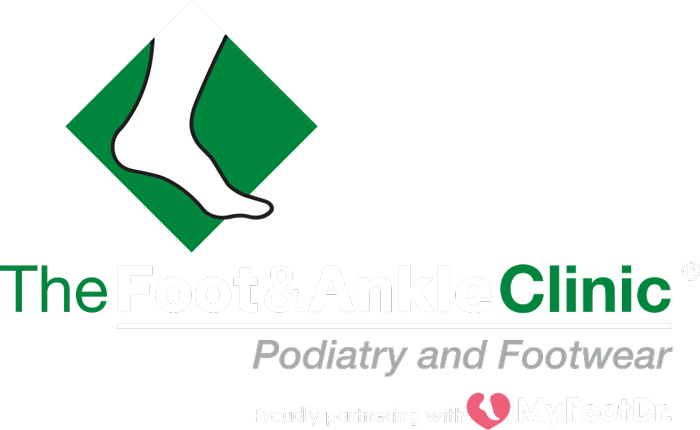Plantar Plate Tear
The plantar plate is a thick ligament type structure with attachments which inserts into the base of our phalanges (toe bones) in the area of the ball of the foot. Injuries of the plantar plates include partial tears through to complete rupture.
The plantar plate is designed to protect the head of the metatarsal from pressure and prevent over extension of our toes.

What Causes a Plantar Plate Tear?
Although plantar plate tears can occur acutely through a stubbing injury, they most often develop slowly over time from a progressive degeneration of the ligament from repetitive overuse or abnormalities, including:
- Biomechanical abnormalities include a short or elevated 1st metatarsal, or a long 2nd or 3rd metatarsal. These abnormalities put constant pressure on the plantar plate and contribute to its degeneration.
- Bunions can also put increased pressure on the plantar plate. Large bunions that push on the 2nd toe can eventually under-lap the toe, causing it to dislocate. This dislocation is caused by of thinning and stretching of the plantar plate as a result of the pressure from the bunion.
- Steroid injections can occasionally cause weakening and thinning of the plantar plate ligament. Patients who have steroid injections to help relieve pain in the ball of the foot may have noticed increasing deviation of the affected toe after the injection.

Plantar Plate Injury Symptoms
- Pain and Swelling. Pain can be described as a dull ache or a sharp pain under the ball of the foot. It may feel as though there is not enough cushion between the bone and the ground
- Shifting of the toe. Over time, as the tear increases, the toe (most commonly the 2nd or 3rd toe) will begin to shift upwards or to one side, especially the 2nd toe moving towards the great toe. When the foot is placed on the ground the toe may not touch. When the toe is elevated in this way, more pressure is placed onto the head of the metatarsal, causing bone bruising and pain.
- Chronic Plantar Plate Injury. If the plantar plate tear is not treated properly, the condition becomes chronic and the deformity can be greater. As the deformity progresses, the cartilage in the joint can become eroded, leading to arthritis and increased pain. Further damage to the plantar plate may cause the toe to dislocate out of joint resulting in a more difficult surgical correction.
In the early stages of the plantar plate injury, conservative treatments can be successful. The first step is to identify and stop the activity that is causing the injury.
Treatment for Plantar Plate Tear
In acute cases, your doctor may prescribe a boot to take weight off the ball of the foot. Tape may be wrapped around the toe to hold it in a downward position for several weeks. If there is any deformity from side to side, the tape can hold the toe in the opposite direction. This allows the ligament to heal without continued strain.
Custom molded orthotics may also be prescribed. Orthotics with support under the ball of the foot alleviates pressure off the overstretched area and keeps the deformity from returning.
But if the toe has drifted significantly, this indicates that the ligaments around the toes have been stretched. In those cases conservative treatments may ease the pain, but surgical treatments are necessary get the toe back into correct position.
Podiatrists at The Foot and Ankle Clinic have vast experience in diagnosing and treating Plantar Plate tears and typically this treatment is very successful but involves a multifactorial approach.
At the Foot and Ankle Clinic our highly qualified team of Podiatrists are all members of the Australian Podiatry Association and offer a combined 50 years’ experience. They are trained to diagnose and effectively treat plantar tear via a range of treatments.
Put your feet in our hands! See us today in Chadstone, East Bentleigh, Moe, Sale, Traralgon, Warragul & Online Store and Retail Enquiries. NO REFERRAL NEEDED!.


